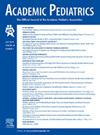Impacts of the Smart Beginnings Parenting Program on Early Childhood Special Education Evaluation and Service Referral
IF 2.8
3区 医学
Q1 PEDIATRICS
引用次数: 0
Abstract
Objective
Little is known about how parenting interventions might influence families’ access to related health care services during early childhood. This study describes the effects of a parenting intervention, Smart Beginnings (SB), on referrals to early intervention (EI) or early childhood special education (ECSE) after evaluation within a predominantly Black/Latine sample with low incomes. SB is a tiered intervention integrating a universal parenting program delivered in primary care clinics (PlayReadVIP) with a targeted home-visiting program (Family Check-Up).
Methods
Data were drawn from a randomized controlled trial of SB, with sites in NYC and Pittsburgh, PA. The 280 families (132 treatment, 148 control) were 43% Black, 47% Latine, 37% Spanish-speaking, and 100% Medicaid-eligible. Hierarchical logistic regressions examined associations between expressive vocabulary and problem behaviors (internalizing and externalizing symptoms) at 2 years, and the impact of the SB intervention on the likelihood of EI/ECSE evaluation and service referrals based on evaluation results by 4 years.
Results
Across sites, children’s lower expressive vocabulary and higher problem behaviors at 2 years predicted receiving EI/ECSE evaluation and service referrals by age 4. Assignment to the SB intervention reduced the likelihood of evaluations leading to referrals for EI/ECSE service.
Conclusions
Results from this randomized controlled trial showed that children with early behavior and language challenges were more likely to receive EI/ECSE evaluation and services by preschool-age. Children assigned to SB were less likely to be referred for services. Studying factors that predict EI/ECSE involvement for children from historically marginalized populations can help promote equity in early care systems.
“聪明的开始”育儿计划对幼儿特殊教育评估及服务转介的影响。
目的:关于父母干预如何影响家庭在幼儿期获得相关医疗保健服务的了解甚少。本研究描述了父母干预的影响,Smart Beginnings (SB),对早期干预(EI)或早期儿童特殊教育(ECSE)的转介进行评估后,主要是低收入的黑人/拉丁裔样本。SB是一种分层干预,将在初级保健诊所提供的普遍育儿计划(PlayReadVIP)与有针对性的家访计划(家庭检查)相结合。方法:数据来自一项SB的随机对照试验,地点在纽约市和宾夕法尼亚州匹兹堡。280个家庭(132个治疗;148例对照)43%为黑人,47%为拉丁裔,37%为西班牙语,100%符合医疗补助资格。层次逻辑回归检验了2岁时表达性词汇与问题行为(内化和外化症状)之间的关系,以及4岁时SB干预对EI/ECSE评估和基于评估结果的服务转介的可能性的影响。结果:两岁儿童较低的表达性词汇量和较高的问题行为预示着到四岁时接受EI/ECSE评估和服务转介。指派SB干预降低了评估导致转介到EI/ECSE服务的可能性。结论:本随机对照试验结果显示,早期行为和语言障碍儿童更有可能在学龄前接受EI/ECSE评估和服务。被分配到SB的儿童不太可能被转介接受服务。研究预测历史上边缘化人群儿童参与EI/ECSE的因素可以帮助促进早期护理系统的公平性。
本文章由计算机程序翻译,如有差异,请以英文原文为准。
求助全文
约1分钟内获得全文
求助全文
来源期刊

Academic Pediatrics
PEDIATRICS-
CiteScore
4.60
自引率
12.90%
发文量
300
审稿时长
60 days
期刊介绍:
Academic Pediatrics, the official journal of the Academic Pediatric Association, is a peer-reviewed publication whose purpose is to strengthen the research and educational base of academic general pediatrics. The journal provides leadership in pediatric education, research, patient care and advocacy. Content areas include pediatric education, emergency medicine, injury, abuse, behavioral pediatrics, holistic medicine, child health services and health policy,and the environment. The journal provides an active forum for the presentation of pediatric educational research in diverse settings, involving medical students, residents, fellows, and practicing professionals. The journal also emphasizes important research relating to the quality of child health care, health care policy, and the organization of child health services. It also includes systematic reviews of primary care interventions and important methodologic papers to aid research in child health and education.
 求助内容:
求助内容: 应助结果提醒方式:
应助结果提醒方式:


